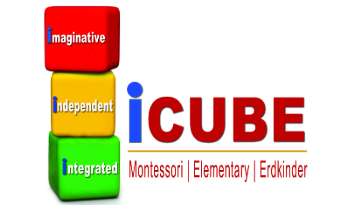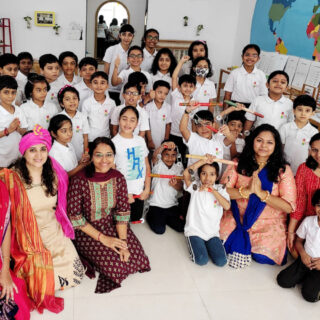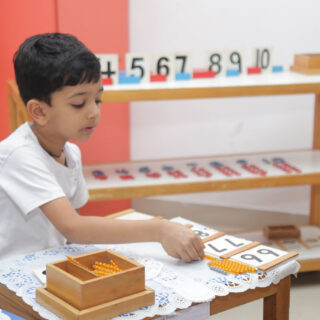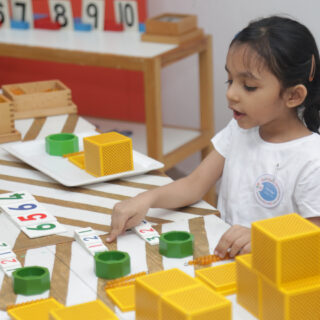FAQs
Montessori (pronounced MON-tuh-SORE-ee) education was founded in 1907 by Dr. Maria Montessori, the first woman in Italy to become a physician. She based her educational methods on scientific observation of children’s learning processes. Guided by her discovery that children teach themselves, Dr. Montessori designed a “prepared environment” in which children could freely choose from a number of developmentally appropriate activities. Now, nearly a century after Maria Montessori’s first casa dei bambini (“children’s house”) in Rome, Montessori ed
Montessori emphasizes learning through all five senses, not just through listening, watching, or reading. Children in Montessori classes learn at their own, individual pace and according to their own choice of activities from hundreds of possibilities. Learning is an exciting process of discovery, leading to concentration, motivation, self-discipline, and a love of learning. Montessori classes place children in three-year age groups (3-6, 6-9, 9-12, and so on), forming communities in which the older children spontaneously share their knowledge with the younger ones. Montessori represents an entirely different approach to education.
Research studies show that Montessori children are well prepared for later life academically, socially, and emotionally. In addition to scoring well on standardized tests, Montessori children are ranked above average on such criteria as following directions, turning in work on time, listening attentively, using basic skills.
Ask if the school is affiliated with any Montessori organization. Ask what kind of training the teachers have. Visit the school, observe the classroom in action, and later ask the teacher or principal to explain the theory behind the activities you saw. Most of all, talk to your child’s prospective teacher about his or her philosophy of child development and education to see if it is compatible with your own.
As with the choice of a Montessori school for children, an adult must also exercise wisdom in choosing a teacher training course. Anyone can legally use the name “Montessori” in describing their teacher training organization. One must be sure the certification earned is recognized by the school where one desires to teach. The two major organizations offering Montessori training in are the Association Montessori Internationale (AMI, Netherland and the American Montessori Society (AMS).
We provide the right environment for the child to blossom to his fullest potential. We encourage and build confidence in the child by providing him an environment where he feels comfortable and secure. He will learn in a fun way that suits his nature and because of this his interest will be there. By the time he leaves preschool, he will have not only the knowledge but also the confidence to speak. From the first day the child arrives in the Montessori School, they are encouraged to speak, we keep in mind that all children are not the same and we practise patience in allowing the child to express his thoughts. We aim to give them a good feeling when speaking in front of a group or an adult so that this will remain with them in an interview scenario.
As a parent beside the child’s physical health and well being, you want them to achieve the most in life. At this young age, the child has an amazing mind that needs the right environment and tools to cater to the child’s thirst for development and knowledge to get to know the world. We have sound knowledge on what the child’s needs are, how the mind is best utilised, what his development path is. With all of this knowledge, we help the child to learn to his maximum potential. We also teach him social norms and expose him to not just academic knowledge but also other essential skills to live a full life, i.e. independence, decision making, confidence in speaking in front of a group, will power etc.





